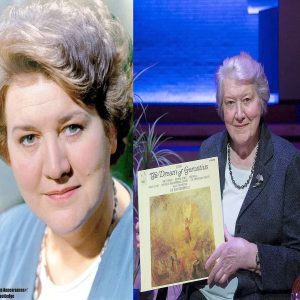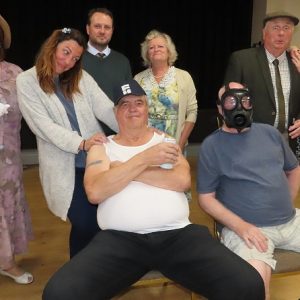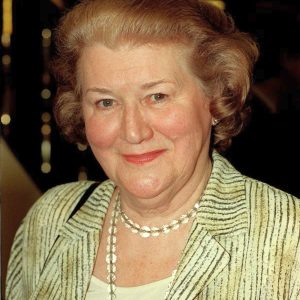Beyond the Bouquet: The Many Faces of Patricia Routledge
When we sat down to interview Dame Patricia Routledge several years ago for The Funny Ladies of British Comedy—a PBS special exploring the women who shaped Britain’s comic sensibility—we were, admittedly, prepared to talk about Hyacinth Bucket. Who wouldn’t be?
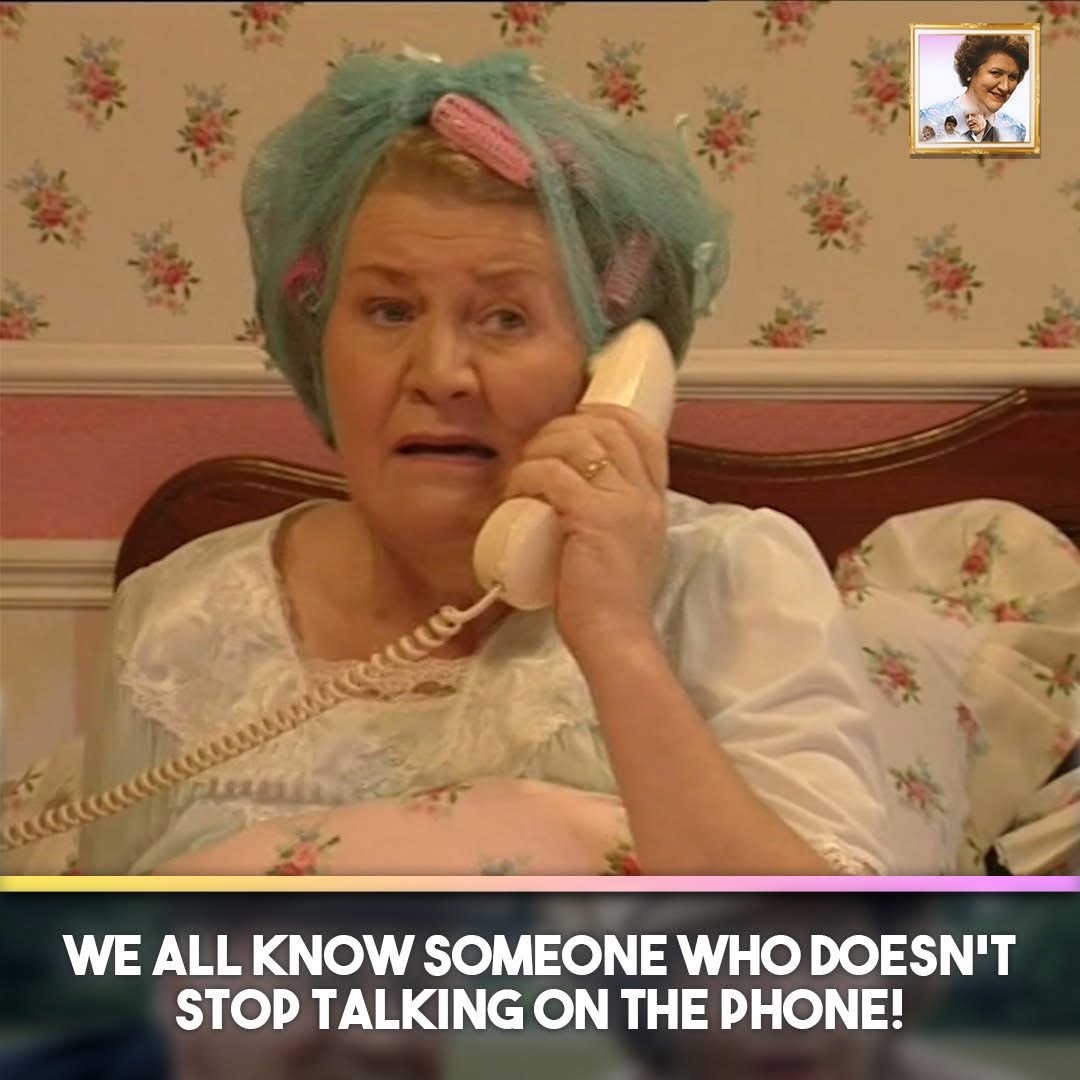
To most, Routledge is indelibly etched into pop culture memory as the hilariously overbearing Hyacinth (that’s “Bouquet,” if you please), the social-climbing housewife from Keeping Up Appearances. With her shrill insistence on candlelit suppers and Sheridan’s “artistic friends,” Routledge delivered one of the great comedic performances of 1990s television. And like millions around the world, we had watched her command the screen with nothing more than a strained smile and a teacup—and expected, perhaps, more of the same in person.
We were wrong.
The conversation that unfolded became one of the most illuminating and unforgettable interviews we’ve ever conducted. Because what we found, seated before us in modest attire with a quiet confidence and extraordinary intellect, was an artist of astonishing breadth and depth—far beyond the confines of any one television role.
The Performer Behind the Persona
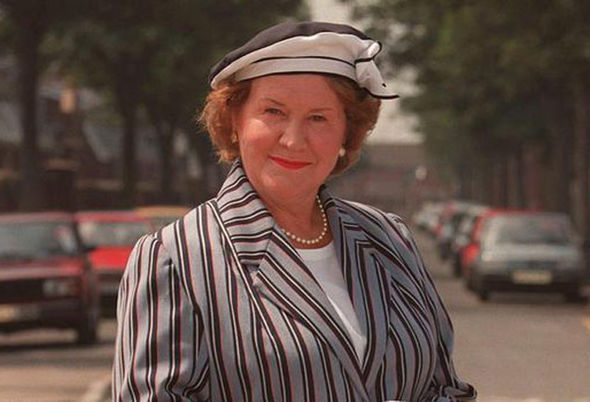
Even those familiar with Routledge’s dramatic gravitas are often unaware of the full scope of her achievements. As we began to discuss her career, it quickly became clear that the woman who brought Hyacinth to life was also a lauded theatrical force, a trained soprano, and a decorated stage actress whose body of work spans decades and genres.
Perhaps most surprisingly—especially for anyone whose only exposure to her singing is Hyacinth’s infamous warblings—Patricia Routledge is a Tony Award-winning musical theatre star.
Yes, really.
In 1968, she dazzled Broadway in Darling of the Day, earning the Tony Award for Best Actress in a Musical. And make no mistake: this was no novelty win. Her performance was praised for both its comedic timing and emotional nuance, her voice praised for its warmth, power, and precision.
It’s almost impossible to reconcile this with the image of Hyacinth Bucket bellowing “Art is calling for me!” at poor Emmet, who would sooner fake a stroke than endure another of her impromptu garden arias. But therein lies the genius of Routledge’s performance: to sing badly—deliberately, comically, yet believably—requires a technical mastery most viewers don’t suspect.
As Routledge herself told us, “You have to be able to sing well in order to sing badly. It’s about control—about knowing just how far to go without tipping into caricature.”
That single remark turned our understanding of Hyacinth on its head. Suddenly, every off-key trill and melodramatic crescendo seemed not absurd, but brilliant. This wasn’t just a character mugging for laughs; this was an actress at the peak of her comedic power, playing a woman desperately reaching for a class and culture that would forever elude her.
A Career Forged in Iron and Imagination
Born in Birkenhead, Cheshire, Routledge cut her theatrical teeth on the British stage long before television came calling. Her early work at the Liverpool Playhouse led to repertory theatre across the UK, and soon to London’s West End and international acclaim.
What stands out about her stage career is the sheer variety. Whether delving into Shakespeare, Restoration comedy, or contemporary drama, Routledge brings to each role an intensity of preparation and a startling emotional clarity. Critics have long noted her rare ability to inhabit both comic and tragic roles with equal command.
In one moment, she can send an audience into helpless laughter. In the next, she can shatter them with a whisper.
Her performance in Talking Heads, the groundbreaking series of monologues by Alan Bennett, ranks among the finest televised acting ever recorded. In “A Lady of Letters,” she portrayed a lonely, judgmental spinster whose misguided sense of morality leads her to prison—and liberation. The monologue earned her a BAFTA nomination and introduced Routledge to a generation who had never seen her tread the boards.
Bennett, who initially struggled to cast her, later admitted she brought a complexity to the role he hadn’t expected. And rightly so. Routledge refuses to coast, to play things “lightly.” Every line, every glance, is intentional.
Reframing Hyacinth
But it’s Keeping Up Appearances that secured Routledge’s place in the hearts of millions. The show, which ran from 1990 to 1995, followed Hyacinth Bucket as she schemed to elevate her social status—despite the best efforts of her lower-class family and long-suffering husband, Richard.
It was Routledge’s commitment to character truth, rather than slapstick, that made Hyacinth so iconic. She never played her as a joke. Instead, she saw Hyacinth as a woman clinging to order and refinement in a world she could not control. That grounding turned what could have been a broad caricature into a deeply human (and painfully funny) portrait of aspiration and delusion.
And then there’s the singing.
As viewers, we laughed ourselves silly watching Hyacinth force her musical “talents” on her horrified neighbor Emmet. But knowing what we now know—that Patricia Routledge could sing any operatic aria with ease—those moments become even more astonishing.
After our interview, we listened to a rarely aired recording of Routledge singing professionally. The transformation is breathtaking. The voice is rich, resonant, entirely at odds with the warbling soprano from her most famous sitcom scenes. It’s as if two different people exist within the same performer. But of course, that’s the mark of a truly great actress.
The Last of Her Kind?
In today’s entertainment landscape, where actors are often typecast, recycled, and rarely challenged, Routledge remains a towering example of what it means to master a craft. She is a performer forged not in celebrity, but in Shakespeare, opera, farce, and monologue. She carries herself with the quiet dignity of someone who has earned everything, and asks for nothing more than the opportunity to work well.
As she told us during that unforgettable interview: “I don’t have professional ambitions. Just to do good work with good people.”
It is a rare statement, in an era of viral fame and fleeting stardom—and perhaps that is why Routledge endures.
So, the next time you rewatch Keeping Up Appearances and laugh at Hyacinth Bucket’s musical mayhem, pause for a moment. Listen closely—not to the notes, but to the genius underneath. Then remember that somewhere behind those comic high notes is a Tony winner, a classical performer, a national treasure.
A woman who can sing better than most of us ever will—and who chose, instead, to sing off-key.
Brilliantly.
Let me know if you’d like this styled for a print magazine layout, transformed into a podcast script, or paired with audio/visual references to her performances.


